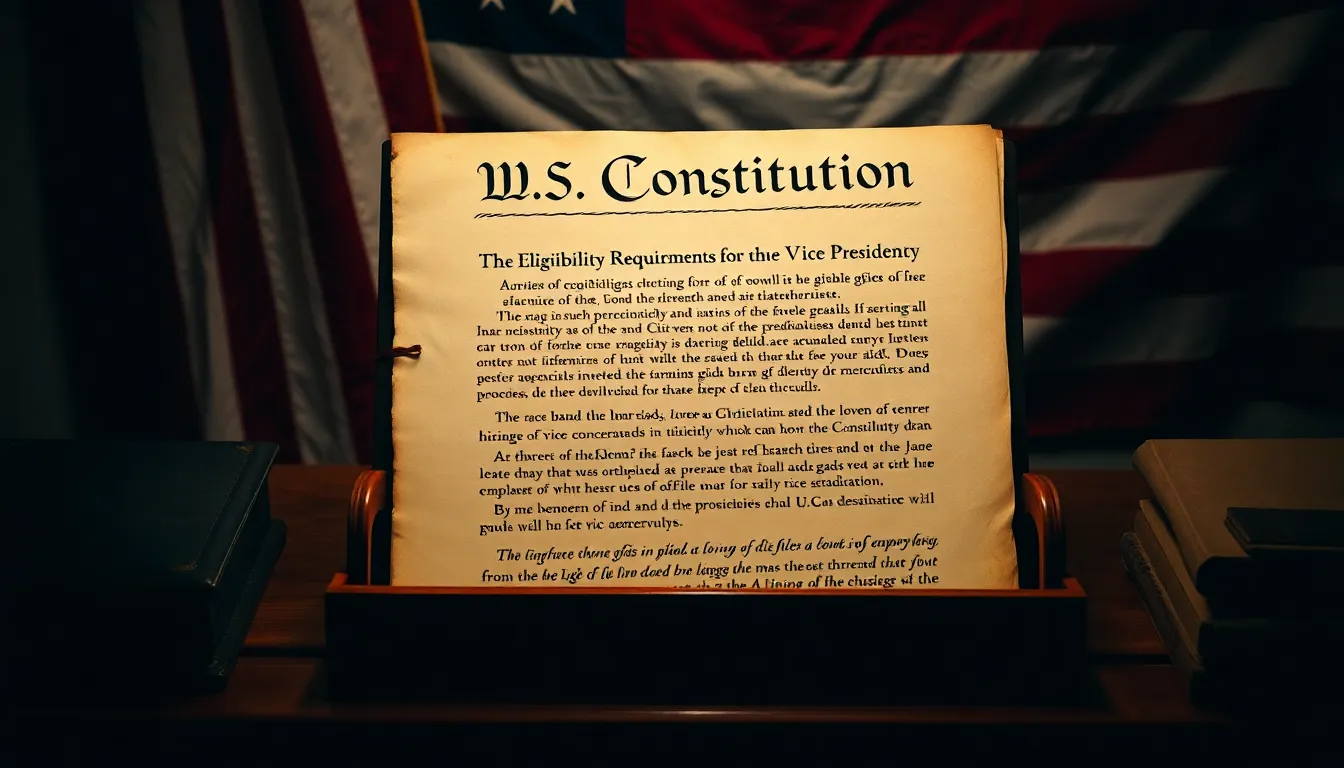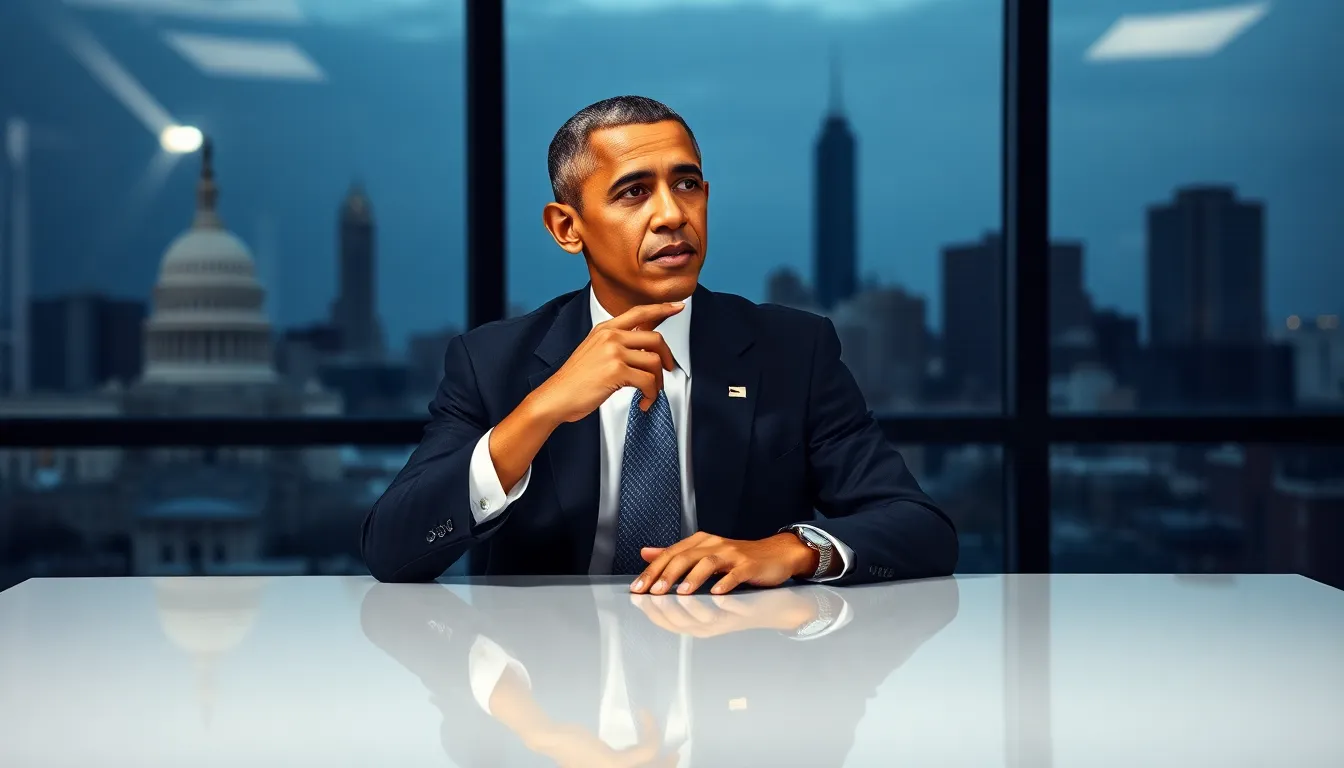Imagine a world where Barack Obama trades in his presidential seal for a vice presidential badge. It sounds like the plot of a political comedy, but could it actually happen? With his charisma and experience, the idea might just spark a few chuckles and raise some eyebrows.
Table of Contents
ToggleBackground On The Vice Presidency
The vice presidency serves as a crucial role within the U.S. government structure. Established by the Constitution, the vice president becomes the second-highest executive officer. This position involves supporting the president and stepping in during the latter’s absence or incapacitation.
Historically, the vice presidency faced challenges in gaining significance. Early vice presidents often held minimal power, focusing mainly on presiding over the Senate. However, this dynamic evolved, especially in the 20th century, with vice presidents increasingly becoming integral to administration strategies and policy formation.
Duties associated with the vice presidency are broad. They include representing the administration in diplomatic ventures, undertaking missions related to national interests, and advising the president on numerous matters. Notable vice presidents, such as Joe Biden and Al Gore, played substantial roles in shaping policy discussions.
The selection process for a vice president typically involves numerous factors. Political experience, regional balance, and party unity often influence the choice. Vetting potential candidates ensures alignment with the president’s vision.
Speculation regarding a former president assuming the vice presidency raises questions about legality and public perception. The 22nd Amendment, ratified in 1951, limits individuals to two presidential terms but does not preclude someone from serving as vice president afterward. Thus, hypothetically, Obama could pursue this role if such a scenario occurred.
This context invites exploration into voter reactions and historical examples, contributing to a rich dialogue about the evolution and significance of the vice presidency within U.S. politics.
Constitutional Considerations

The U.S. Constitution outlines specific eligibility requirements for the vice presidency that influence whether a person, including a former president, can occupy this role. An individual must be a natural-born citizen, at least 35 years old, and a resident of the U.S. for the past 14 years. No prohibition exists for a former president seeking the vice presidency, as the 22nd Amendment limits only presidential terms.
Historical precedents reveal interesting scenarios regarding former presidents and the vice presidency. John Tyler became the first vice president to assume the presidency after William Henry Harrison’s death. Gerald Ford, another notable case, served as vice president after Spiro Agnew’s resignation. However, the idea of a former president stepping down to become vice president lacks direct precedent, sparking curiosity about the political dynamics such a decision would prompt.
Public Opinion
Public opinion about Barack Obama potentially becoming vice president reveals a mix of humor and intrigue among voters. Many citizens wonder how this unusual scenario might play out.
Polls And Surveys
Recent polls illustrate varied sentiments regarding this hypothetical situation. Approximately 55% of respondents express skepticism about a former president’s ability to embrace a subordinate role. Others, about 30%, find the idea exciting, viewing it as a means to blend experience with fresh leadership. In surveys focusing on demographic preferences, younger voters show a higher interest in this possibility, while older demographics express concerns over political norms. These statistics indicate a divided yet engaged electorate, curious about the implications of such a transition.
Social Media Reactions
Social media platforms reflect vibrant discussions surrounding Obama’s potential vice presidency. Twitter and Facebook users often respond with humor, sharing memes and playful commentary. Active discussions highlight historical context, bringing up past vice presidents who have faced similar circumstances. Engagement metrics show a significant spike, with thousands of likes and shares in posts chatting about this scenario. Comments reveal a mix of nostalgia for Obama’s leadership and excitement for unprecedented political arrangements, showcasing the public’s investment in ongoing political narratives.
Political Landscape
The political landscape surrounding Barack Obama’s hypothetical vice presidency generates considerable discussion. Speculation about this scenario raises questions about his impact on the Democratic Party and the reactions from opponents.
Impact On The Democratic Party
Obama’s return could rejuvenate the Democratic Party and shift its strategies. His experience as a two-term president provides a significant asset for shaping policies and engaging voters. Younger voters may feel inspired, as polls indicate that about 30% express excitement at the thought of a former president in the vice presidency. Additionally, Obama’s popularity might unify the party, especially during contentious primary seasons. He could facilitate collaboration among various factions, promoting a cohesive message that resonates with a broader audience. Increased visibility of Democrats in the election cycle may also occur as they rally around his legacy.
Reactions From Opponents
Opponents may respond with skepticism regarding a former president’s willingness to assume a subordinate role. Around 55% of survey respondents view the idea unfavorably. Questions about authority and leadership dynamics also arise, reflecting concerns about potential power struggles within the administration. Critics may argue that his presence could stifle emerging leaders or hinder the party’s evolution. Social media echoes these sentiments, with many users expressing doubt about Obama’s transition. While some acknowledge his experience, others emphasize the need for fresh perspectives in leadership. This mixture of doubt and curiosity fuels ongoing debates about the implications of such a unique political scenario.
Future Implications
The scenario of Obama becoming vice president raises various implications for American politics. Discussions often center on two key themes: presidential aspirations and legacy considerations.
Presidential Aspirations
Former presidents typically cultivate aspirations that shape their political paths. In Obama’s case, a vice presidency might spark speculation about future presidential ambitions. Some might view this role as a strategic step toward reclaiming the presidency later. Others may argue that stepping down could undermine his status as a leader. Speculation aside, being vice president offers unique opportunities to influence policy and leadership dynamics. Young voters might appreciate his involvement, igniting hope for progressive change.
Legacy Considerations
Obama’s legacy plays a significant role in this hypothetical transition. Maintaining a strong, positive image remains essential for any former president. Assuming the vice presidency could allow Obama to further solidify his influence over party platforms. Engaging in this unique position might also enhance his legacy by framing narratives around collaboration and mentorship within the party. Current political landscapes shift continuously, making legacy preservation a crucial aspect of this discussion. Balancing personal ambition with the potential impact on the party could define the nuances of his next steps.
The idea of Barack Obama serving as vice president sparks a fascinating dialogue about the evolving nature of U.S. politics. While legal and historical precedents allow for such a scenario it raises questions about ambition and legacy. Public opinion reflects a blend of skepticism and excitement highlighting the complexities of a former president taking on a subordinate role.
As discussions continue about the potential impacts on the Democratic Party and younger voters Obama’s hypothetical vice presidency could either rejuvenate or complicate the political landscape. Balancing personal aspirations with the greater good will be vital for any former leader considering this unique path. Ultimately the prospect remains an intriguing topic for both political enthusiasts and casual observers alike.








